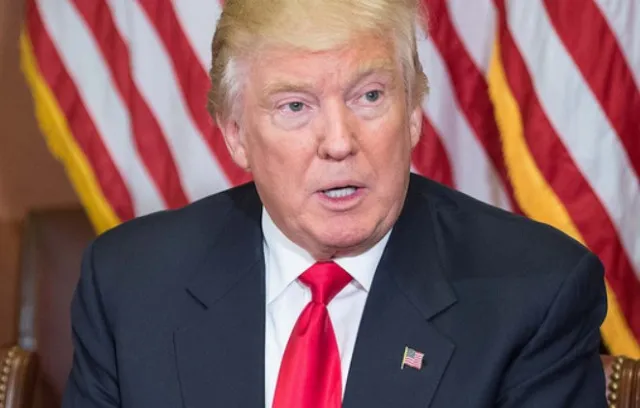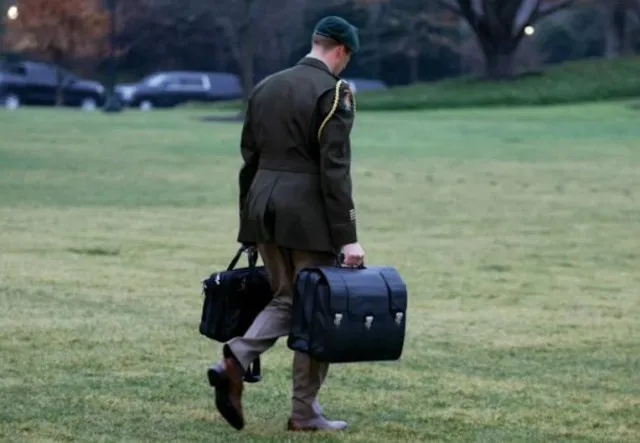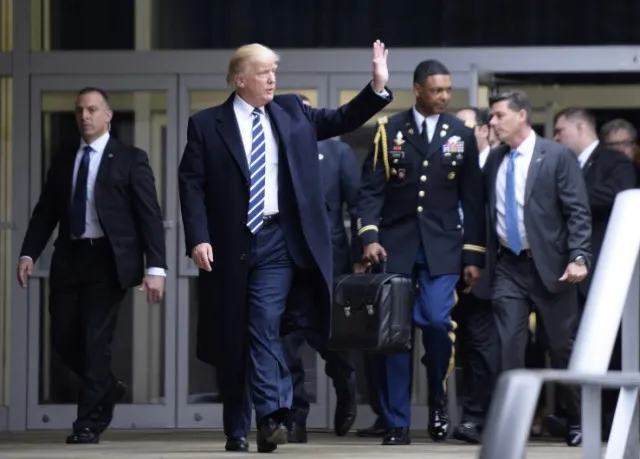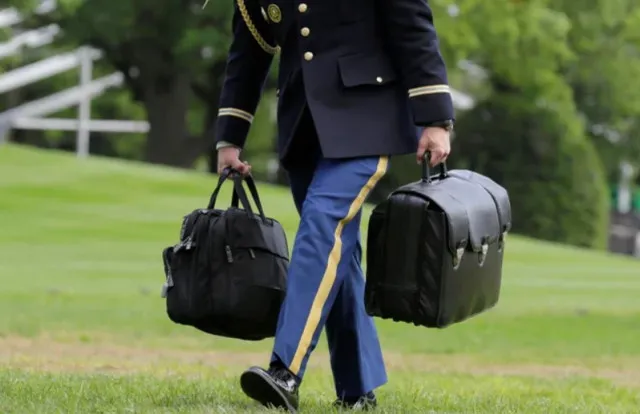The nuclear football Donald Trump keeps nearby holds vital military secrets and tools for launching a nuclear strike at any moment.
The ‘nuclear football’ is a term used to describe an important briefcase carried by a military aide.
This briefcase is always near the President of the United States, ensuring that they can respond quickly in case of a nuclear emergency.
While many people may think the president carries it themselves, it is actually the job of a military aide to keep it close.
The history of the nuclear football
The public became aware of the nuclear football in 1963 when a photograph showed it at the Kennedy Family Compound.

The name “nuclear football” was first used by White House aide Jack Valenti in a newspaper article.
The nickname likely refers to the Kennedy family’s interest in touch football.
Since then, the term has been widely used to describe this critical piece of equipment.
What’s inside the ‘nuclear football’ that Trump always carries with him wherever he goes?
Inside the nuclear football, there are several important items.
Although there is no actual “nuclear button,” the briefcase contains communication tools and authentication codes.
These elements are necessary for the president to order a nuclear strike if needed.
The most important item in the case is a card called the “biscuit.”

The biscuit is a physical card that contains codes. These codes help the president identify themselves to the military.
It is essential for the president to use this card when giving orders for a nuclear strike.
The football itself serves as a tool for communication and planning, while the biscuit is crucial for authentication.
The process of ordering a nuclear strike
When a president decides to order a nuclear strike, they must first identify themselves using the biscuit.
After confirming their identity, the president can then communicate their orders to the highest-ranking military officer, known as the Chairman of the Joint Chiefs of Staff.
This officer is responsible for ensuring that the orders are executed correctly.

Once the order is given, it is sent to the U.S. Strategic Command headquarters located at Offutt Air Force Base in Nebraska.
The codes provided by the president must match the codes in the safes of the launch team.
This process ensures that the president’s orders cannot be ignored.
Concerns arise over the president’s nuclear authority.
After Donald Trump took office, some lawmakers raised concerns about the power of the president to initiate a nuclear strike.
Senator Edward J. Markey and Congressman Ted Lieu emphasized the need to limit this authority.
They argued that no single person should have the power to start a nuclear war without checks and balances in place.
These officials believe it is crucial to involve Congress in decisions related to nuclear strikes.
They want to ensure that the authority to launch such a significant attack does not rest solely on one individual.
This has led to discussions about putting guardrails around presidential powers in this area.

The threat of nuclear war
The possibility of nuclear war is a serious concern in modern society. Experts warn that a nuclear strike could lead to catastrophic consequences.
According to some estimates, billions of people could die within days of a nuclear attack.
This grim reality emphasizes the importance of responsible leadership and decision-making.
In discussions about the effects of a nuclear strike, experts describe potential scenarios in horrifying detail.
The immediate destruction from a nuclear blast would be immense, affecting a wide area.
The subsequent fires and radiation would worsen the situation, demonstrating why careful handling of nuclear power is essential.